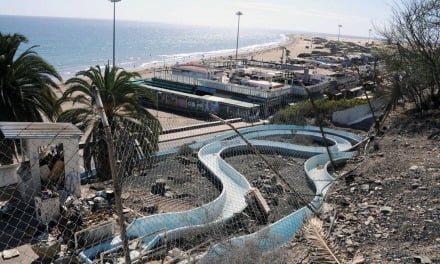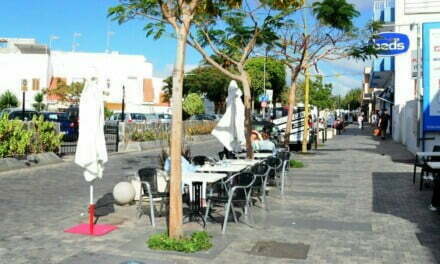The Canary Islands attract millions of visitors each year, and a long running battle over the tourism law governing private property has once again spilled out on to the headlines following recent fines issued and disputed. Since the early 1960s, tourism has grown to become the primary economic contributor to the archipelago, particularly in places like Maspalomas and Puerto Rico de Gran Canaria over the last three generations, generating jobs and income for the the local population and foreign residents alike. However, in 2013, the Canarian government passed legislation aimed at extended existing laws to regulate the tourism industry, which has resulted in negative consequences for property owners in the region.
Canary Islands’ Tourism Law
The 2013 Law of Tourism in the Canary Islands started to be applied in 2015 and aimed to regulate tourist accommodations in the region, defining tourist accommodation as any property rented out for periods of less than three months to tourists for profit. The legislation required all tourist accommodation providers to register their properties with the local authorities and obtain a license. Property owners who did not comply with the law were subject to fines. This was not completely new legislation, but sought to more clearly set out the rules around short term lets in apartment complexes, many of which had been built on land designated specifically for tourism use, as well as those licensed to operate as tourism businesses.
The basic rule of thumb was that if the complex was built on tourism land, then it was not supposed to be used for residential long term rentals. However the complexity of Spanish property laws, which also focuses on individual ownership of properties within a shared community development, meant that over time some properties fell out of use and started to be bought and sold as private residences. Further complicated by the requirement for communities of owners to decide by majority vote whether or not to act as tourism accommodations, and if they did they were all compelled to use an individual licensed “exploitation” company to manage the tourist apartments in any given complex. A provision with which the Ombudsman (Defensor del Pueblo) strongly disagreed in a published opinion.
 Some owners wanted just to live in their properties, others wanted long-term rental incomes, some were seeking to offer tourism short-term lets, and others wanted to chop and change without having to deal with anyone else, in a lot of cases not properly declaring their income. All of this occurring over 40-50 years, uncontrolled by local authorities, meant that by the time the regional government sought to properly regulate the usage of these properties the situation had become rather ungovernable.
Some owners wanted just to live in their properties, others wanted long-term rental incomes, some were seeking to offer tourism short-term lets, and others wanted to chop and change without having to deal with anyone else, in a lot of cases not properly declaring their income. All of this occurring over 40-50 years, uncontrolled by local authorities, meant that by the time the regional government sought to properly regulate the usage of these properties the situation had become rather ungovernable.
The new law has had a significant impact on many property owners who have owned apartments in tourist areas for many years. Some of whom have been renting their properties to tourists for decades and rely on this income to support themselves and their families. This is compounded not only by the large number of properties that have changed hands over time, but also by the origins of many of these apartment complexes, in places like Playa del Inglés, Maspalomas, San Agustin & Puerto Rico de Gran Canaria.
 In the case of the first resorts, in the early 60s, construction was often funded through finance derived from capital provided by ordinary Canarian families, many of them from agricultural origins, who were persuaded to invest in small bungalows and apartments on the basis that the tourism income throughout the autumn and winter months would pay off their mortgages, also allowing them and their families to even holiday, during the summer months, for many their first such leisure opportunities. All of this with the promise of being able to participate in the tourism boom, and in the end own their own assets to hand down to their children. Of course as tourism boomed, so more and more of these properties sprang up, sometimes with dubious paperwork and rarely any real oversight of how they operated or passed from one owner to the next.
In the case of the first resorts, in the early 60s, construction was often funded through finance derived from capital provided by ordinary Canarian families, many of them from agricultural origins, who were persuaded to invest in small bungalows and apartments on the basis that the tourism income throughout the autumn and winter months would pay off their mortgages, also allowing them and their families to even holiday, during the summer months, for many their first such leisure opportunities. All of this with the promise of being able to participate in the tourism boom, and in the end own their own assets to hand down to their children. Of course as tourism boomed, so more and more of these properties sprang up, sometimes with dubious paperwork and rarely any real oversight of how they operated or passed from one owner to the next.
The new legislation made it challenging for property owners to continue to rent out their properties, many say that the registration process is overly complex and costly, particularly in places like San Bartolomé de Tirajana. Others say the state has no right to dictate to them how they use their properties, while many in the tourism industry object to the unregulated short-term rental of apartments meant to form part of a destination resort, saying that this leads to degradation and decay of the tourism offer.
The Plataforma de Afectados por la Ley Turística (PALT – Platform for those Affected by the Tourism Law) is a group that formed in 2015 to defend the rights of property owners affected by the new legislation, after the San Bartolomé de Tirajana town hall tried to impose local ordinance that threatened “owner substitution” effectively to expropriate properties from owners who would not comply with the tourist law registration and exploitation requirements, leaving them still liable for maintenance costs, but without a say on income nor allowed to live in their own properties, something Spain’s ombudsman took exception to. The group argues that the law is unjust and unconstitutional, as it violates the property rights of owners who have been renting their properties for years. The group claims that the law has resulted in many property owners being fined for not complying with the new regulations.
PALT’s new president, Maribe Doreste, recently held a meeting in Playa del Inglés, where she addressed the concerns of about 500 affected property owners. Doreste explained that their association has already filed a lawsuit against the first sanctions imposed by the regional government on owners who object to being told how to use their properties. According to Doreste, the recent sanctions are void because they go against the transitional provisions of the 2017 Land Law, announced in response to the outcry in 2015, which states that if an apartment had residential use on January 1 of that year, that such use is legal and consolidated.
Doreste explained that the legislation was unfair and unconstitutional, but that the transitional law gives them the right to stay, in these cases. The association informed affected property owners that they have submitted a legislative initiative to the Canary Islands Parliament, which will be debated in the new legislative term, following the elections at the end of May.
 PALT also provided documentation necessary to help affected property owners defend themselves in case they receive fines. The Plataforma de Afectados por la Ley Turística argues that the law has had a detrimental effect on the local economy, and resulted in many properties being taken off the rental market, which has led to a shortage of accommodation for tourists. This shortage has caused prices to increase, making it more difficult for tourists to afford to visit the Canary Islands. The impact of the law has also been felt by businesses that depend on tourism, PALT claims many small businesses that provide services to tourists, such as restaurants and shops, have seen a significant drop in clientele as a result. The reduction in tourism has led to a decrease in income for these businesses, making it difficult for them to stay afloat.
PALT also provided documentation necessary to help affected property owners defend themselves in case they receive fines. The Plataforma de Afectados por la Ley Turística argues that the law has had a detrimental effect on the local economy, and resulted in many properties being taken off the rental market, which has led to a shortage of accommodation for tourists. This shortage has caused prices to increase, making it more difficult for tourists to afford to visit the Canary Islands. The impact of the law has also been felt by businesses that depend on tourism, PALT claims many small businesses that provide services to tourists, such as restaurants and shops, have seen a significant drop in clientele as a result. The reduction in tourism has led to a decrease in income for these businesses, making it difficult for them to stay afloat.
Furthermore, the new legislation has led to an increase in the number of unlicensed and illegal rentals. Property owners who cannot afford the registration process or do not want to go through it have started to rent their properties illegally, which has led to a lack of quality control and safety measures. This has resulted in many tourists staying in substandard accommodation, which can have negative consequences for the tourist experience and the region’s reputation.
The tourism law was designed to crack down on unregulated holiday rentals and to protect the hotel industry, but it has created a backlash among local residents who feel it is punishing them for owning properties in certain areas. The law requires that homeowners obtain a licence in order to rent out their properties to tourists, and it prohibits such rentals in certain areas designated as “touristic zones”. Those who violate the law are subject to hefty fines, and some have reportedly even had their properties seized by the government.
The group argues that the law violates their constitutional right to property, and that it has been applied inconsistently and unfairly. The group also claims that the law has failed to achieve its stated goal of regulating holiday rentals, as many homeowners continue to rent out their properties without a licence. The controversy surrounding the law was compounded by the COVID-19 pandemic, which devastated much of the tourism industry and led to an increase in unlicensed holiday rentals. In response, the government has stepped up its enforcement of the law, leading to further conflict with local residents. The situation has come to a head in recent months, with protests and legal challenges mounting against the law.
 Ombudsman declares the law limits “the right to property, and also to the freedom of enterprise”
Ombudsman declares the law limits “the right to property, and also to the freedom of enterprise”
In March 2021, the Ombudsman for Spain’s Canary Islands issued a scathing report on the Canary Islands’ Law of Tourism, describing it as “unjust”, “unequal” and “one sided”. The report criticised the law for being too vague and for violating homeowners’ rights, and it called on the Regional Government to revise the legislation and provide clearer guidelines for enforcement. The Ombudsman’s report was welcomed by PALT, which has long been calling for it to be scrapped or revised. The group argues that the law has caused widespread hardship for homeowners, who are facing financial ruin due to fines and legal costs associated with defending their rights. Despite the criticism, the government has so far refused to back down, arguing that it is necessary to protect the hotel industry, tour operators and to regulate holiday rentals. The government has also pointed out that many other regions in Spain have similar laws in place, and that the law has the support of the hotel industry and many local residents.
The conflict over the tourism law is indicative of a larger issue facing Gran Canaria and other popular tourist destinations around the world. As tourism has boomed in recent years, there has been increasing pressure on local resources and infrastructure, leading to conflicts between tourists and residents. The pandemic brought these conflicts to the forefront, as a worldwide collapse in the tourism industry forced many destinations to confront the impact of “overtourism” and to rethink their approach to the holiday industry.
In the case of Gran Canaria, the conflict over the tourism law is exacerbating existing tensions between the needs of tourists and residents. The island has long been a popular destination, but the influx of visitors has put a strain on the island’s resources and led to a housing shortage. Many local residents feel that the government has prioritised the interests of the hotel industry over their own interests, and that the tourism law is a blatant violation of their rights in their own homes.
The situation is unlikely to be resolved any time soon, as both sides are entrenched in their positions. The government is unlikely to repeal the law, as it has the support of the wider tourism industry as well as some residents.
PALT, meanwhile, is unlikely to back down from its opposition to the law, while the tourism industry continues to denounce repeated breaches of the legislation. Companies warn that residents are selling apartments to foreigners at exorbitant prices, which are then rented out irregularly. Tourism complex operators denounce the systematic breach of the law by apartment owners who sell or rent out their properties without any control, resulting in a decrease in the quality of the destination, problems with coexistence, and difficulties in renovating or improving establishments.
 Tourist Complexes Demand Enforcement
Tourist Complexes Demand Enforcement
Despite the fact that the vast majority of these tourist areas were meant for exclusive economic use, residentialisation and the irregular rental of apartments and bungalows are causing a “serious problem,” warns Maialen Artetxe, manager of the Jardín del Atlántico tourist complex in Playa del Inglés.
Artetxe claims that the phenomenon of buying or renting these apartments owned by residents is increasing, stating that many Italians and Germans have acquired them and then rent them out without control, at prices that directly affect the exorbitant costs of residential rents, but without being managed by an exploitation company that would help the sector generate more employment and activity on the islands.
“Public administrations are not doing their job, the law is being violated, and no one is doing anything about it. There are not enough sanctions, and there are few inspectors to control what happens here. People are not aware of what is happening,” she laments.
Recently, several inspectors visited her complex at the request of the exploitation company, and at least 15 apartments were found to be engaged in irregular activity. In this regard, lawyer Carlos Bethencourt, who specialises in tourism litigation and has brought several cases against residentialisation, questions the fact that several complaints have been filed with the Town Council of San Bartolomé de Tirajana, but, he says, they are failing to act even though it is they who have the urban planning competences on land that is exclusively designated for tourism use. The lawyer claims that “90% of apartments in the tourist area are used for tourism”
The AEAT (La Asociación de Empresarios de Alojamientos Turísticos de Las Palmas) stresses that it is not “fair” to “allow a minority to put at risk the majority of a sector that is doing things right”, insisting on the need for “the competent authorities to act, with the necessary resources, against this type of illegal activity that generates unfair competition and is deteriorating the image of the destination”.
The association also asks for “firmness” in the application of sanctions and calls for “the need for coordination between the different administrations involved, such as the Canarian and local governments, the tax agency, and the security forces, to act in a coordinated manner against this problem”.
The conflict between tourism companies and homeowners in tourist areas is not new in the Canary Islands, where the issue of residential tourism and the shortage of affordable housing for residents has been a concern for years. However, with the pandemic and the subsequent rise of teleworking, the situation has now become more acute, as these days many people are now able to live and work remotely from the island, leading to a surge in demand for long-term rental properties. In this context, the authorities are facing the challenge of balancing the interests of different stakeholders, including the tourism sector, residents, and the real estate market, and ensuring that the growth of tourism does not come at the expense of the quality of life of the local population.
As for the tourism companies, they are calling for stricter enforcement of the law and the creation of a level playing field in the market, arguing that the illegal activity of some homeowners is distorting the market and causing unfair competition, as well as undermining the quality of the tourist destination. The situation in the Canary Islands is not unique, and similar conflicts between tourism companies and homeowners have been reported in other tourist destinations, such as Barcelona, Venice, and Amsterdam.
One thing seems clear, rents are continuing to rise; often pricing locals and workers further and further away from resort areas, whilst deterring budget travellers and family package holiday makers, and all while our original destinations and resorts appear to deteriorate.
Residents find themselves in conflict with tourism operators and middlemen engaged in exploitation, while real estate companies struggle to keep up with demand and keep their clients informed of the legalities. The lawyers and notaries are busy, and the town hall’s under siege.











